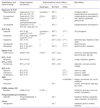Abstract
Gastrointestinal motility modulating drugs include all compounds which have pharmacological activity of modulating (stimulating or inhibiting) gastrointestinal motility. They are mainly used for the treatment of functional gastrointestinal diseases. Gastrointestinal motility modulating drugs include 5HT receptor agonists, antagonists, and antidopaminergic agents. Many new gastrointestinal motility modulating drugs are currently under investigation. The aims of this article are to review the mechanism of action, efficacy and side effects of the gastrointestinal motility modulating drugs.
Figures and Tables
Table 1
Pharmacodynamic properties, gastrointestinal motor effects and side effects of gastrointestinal modulating drugs

R: receptor, Sx: symptom, Pr: pressure,
AG: agonist, AT: antagonist
SSRI: selective serotonin reuptake inhibitor
GET (gastric emptying time)↑: accelerate , ↓:delay
CTT (colon transit time)↑: accelerate , ↓: delay
LES: low esophageal sphincter
TLESR↓: reduces transient low esophageal sphincter relaxation
GA (gastric accomodation) ↑: enhance, ↓: decrease
References
1. Karamanolis G, Tack J. Promotility medication-now and in the future. Dig Dis. 2006. 24:297–307.
2. Tonini M, Cipollina L, Poluzzi E, Crema F, Corazza GR, De Ponti F. Clinical implications of enteric and central D2 receptor blockade by antidopaminergic gastrointestinal prokinetics. Aliment Pharmacol Ther. 2004. 19:379–390.

3. Tack J. Prokinetics and fundic relaxants in upper functional GI disorders. Curr Opin Pharmacol. 2008. 8:690–696.





 PDF
PDF ePub
ePub Citation
Citation Print
Print


 XML Download
XML Download